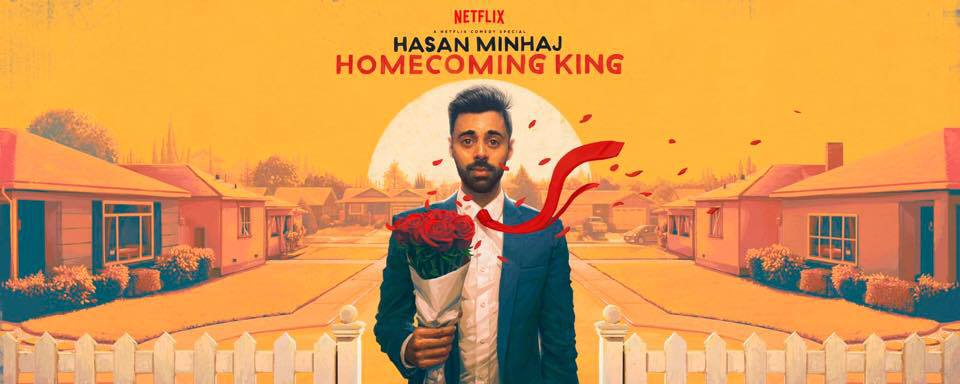
One of the riffs in Hasan Minhaj’s new Netflix stand-up special, “Homecoming King,” centers on the stoic nature of immigrant fathers. He observes how “you could wake an immigrant father up from a twelve-hour nap and he would still be like *insert what the subtitles dubbed an ‘angry yawn’ here,” even going so far as to call out certain “uncles” in the audience who aren’t smiling.
https://www.facebook.com/1841527409444426/videos/vb.1841527409444426/1841529496110884/?type=2&theater
Well, my dad—a mustachioed doctor, a virtual caricature of the Indian father—was quiet for most of Minhaj’s special. His mustache would wag every now and then, hinting at a smile, but overall, we got nothing.
At the end, though, as Minhaj concluded with a gleeful, “Once you go brown, you gotta lock that shit down!” my dad barked out a laugh. “He’s too good,” he chuckled. “Just too good.”
This was high praise indeed; my siblings and I have tried to interest our dad in stand-up for years, but to no avail. His quiet joy cemented what I’ve suspected for a while now: Minhaj is something special.
“Homecoming King” has more in common with a TED Talk than your typical stand-up. Through his self-deprecating humor and biting cultural insights, Minhaj guides his viewers through his life, from “popping out” in the prime real estate of the U.S.
(“For all the brown folk in the audience, you know that means you’ve made it”)
to finally snagging The Daily Show gig that catapulted him into stardom. He helps the audience experience something they may never have the opportunity to otherwise: coming of age in America—in brown skin.
[Read More: Why it’s Important for Every Immigrant to Make Sense of Their Story]
Most innovative for the stale stand-up format, perhaps, is Minhaj’s apt use of visual aids (furthering the TED-esque vibe of the special); he adds photos of himself at key moments in his life (the senior-year graduation picture yielded laughs and claps from the audience, to which he snapped,
“Don’t clap for that! No one did in high school!”
as well as carefully-curated graphics, such as providing his audience a helpful list of (hilarious) differences between Hindus and Muslims when explaining why his choice to marry a Hindu woman sparked such controversy. During a riff on brown parenting, he throws up a video of Arvind Mahankali’s 2013 Scripps National Spelling Bee win. After correctly spelling “knaidel” and winning, Mahankali’s face appeared almost emotionless. “You wanna know where that comes from?” Minhaj asks, and cuts away to footage of Mahankali’s equally-passive parents. Adding to the hilarity is Mahankali’s younger brother, also stiff, perhaps thinking, as Minhaj believes,
“I’m fucked! The bar is set too high!”
Over the scene, the words “conditional love” blink in bright yellow.
[Read More: Hasan Minhaj’s Top 10 Moments at the 2017 White House Correspondents’ Dinner]
Minhaj has frequently been likened (favorably) to established comedian Aziz Ansari, but the comparison does neither of them any favors: the two are as different as any two white comedians, and that’s the point. They demonstrate how they—and, indeed, brown artists at large—refuse to be boxed in any longer by lazy categories such as “niche” comedy. They are people, wholly and fully, unique and worth your time in very different ways. For far too long, culturally-oriented art has been dismissed as a monolith; if you’ve read Jhumpa Lahiri, there’s no need to touch Arundhati Roy, or so people seem to believe. In his memoir-style special, however, Minhaj demonstrates exactly why his brand can’t be shrugged off as mere “Indian” comedy.
His unique experiences, by no means representative of the immigrant experience at large, constitute his comedic fodder: his mother’s separation from him as a child, for instance, and his aghast surprise at his sister’s existence when the two of them reunite with Minhaj and his father in America. He then deftly ties these remarkably specific experiences to broader ideas that resonate not only with Indians, but audiences of every color of the rainbow. He revels in his utter humanity, and, ultimately, that’s what makes this deeply-felt special stand out.
At the end of his hour onstage, Minhaj claims (tongue-in-cheek, of course) to be “the cure for racism.” After watching it thrice, I’m almost tempted to agree.
 Namrata is a rising junior and Robert W. Woodruff Scholar at Emory University, pursuing a double major in English/Creative Writing and Psychology/Linguistics. An aspiring writer, her work has appeared or is forthcoming in storySouth, Litro Magazine, NY Literary Magazine, VoiceCatcher, Paper Darts, and elsewhere. She loves reading, coffee, and Bollywood music (and combining all three at the same time!).
Namrata is a rising junior and Robert W. Woodruff Scholar at Emory University, pursuing a double major in English/Creative Writing and Psychology/Linguistics. An aspiring writer, her work has appeared or is forthcoming in storySouth, Litro Magazine, NY Literary Magazine, VoiceCatcher, Paper Darts, and elsewhere. She loves reading, coffee, and Bollywood music (and combining all three at the same time!).





